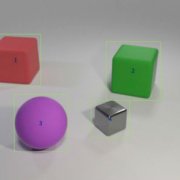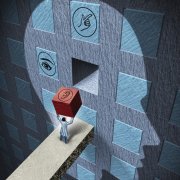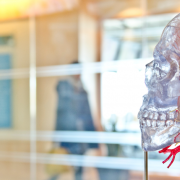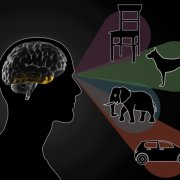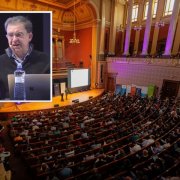April 8, 2019 - 9:00 am
Together, deep learning and symbolic reasoning create a program that learns in a remarkably humanlike way.
by Will Knight
Excerpt: "Over the decades since the inception of artificial intelligence, research in the field has fallen into two main camps. The “symbolists” have sought to build intelligent machines by coding in logical rules and representations of the world. The “connectionists” have sought to construct artificial neural networks,...
April 2, 2019 - 4:00 pm
MIT Building 46-3002 (Singleton Auditorium)
Dr. Jon Bloom, Broad Institute
Abstract: When trained to minimize reconstruction error, a linear autoencoder (LAE) learns the subspace spanned by the top principal directions but cannot learn the principal directions themselves. In this talk, I'll explain how this observation became the focus of a project on representation...
April 2, 2019 - 1:15 pm
Researchers combine statistical and symbolic artificial intelligence techniques to speed learning and improve transparency.
Kim Martineau | MIT Quest for Intelligence
A child who has never seen a pink elephant can still describe one — unlike a computer. “The computer learns from data,” says Jiajun Wu, a PhD student at MIT. “The ability to generalize and recognize something you’ve never seen before — a pink elephant — is very hard for machines.”...
April 1, 2019 - 11:45 am
Machine Learning and Artificial Intelligence (AI) will impact several sectors in a big way in the next ten years, especially healthcare, with several jobs to be affected and many other interesting jobs to emerge, an expert told Gulf Times.
“Healthcare is an area where machine learning will have a huge impact," explained Dr Antonio Torralba, a professor of electrical engineering and computer science at the Massachusetts Institute of Technology (...
March 26, 2019 - 4:00 pm
Xavier Boix Bosch
Abstract: Recent progress in computer vision has led to new unresolved questions about their emergent properties. Understanding the emergent behaviour of computer vision algorithms can fuel the engineering of computer vision and help understand biological intelligence. In this talk, I will discuss...
March 22, 2019 - 4:00 pm
Julio Martinez-Trujillo
Abstract: The brain’s memory systems are like time machines for thought: they transport sensory experiences from the past to the present, to guide our current decisions and actions. Memories have been classified into long-term, stored for time intervals of days, months, or years, and short-term,...
March 22, 2019 - 12:00 pm
McGovern Institute researchers find that the brain starts to register gender and age before recognizing a face.
Sabbi Lall | McGovern Institute for Brain Research
Our brains are incredibly good at processing faces, and even have specific regions specialized for this function. But what face dimensions are we observing? Do we observe general properties first, then look at the details? Or are dimensions such as gender or other identity details...
March 20, 2019 - 4:00 pm
Demis Hassabis, Co-Founder & CEO, DeepMind
This talk is co-hosted by the Center for Brains, Minds, and Machines (CBMM) and MIT Quest for Intelligence.
Abstract: Demis Hassabis will discuss the capabilities and power of self-learning systems. He will illustrate this with reference to some of DeepMind's recent breakthroughs, and talk about...
Abstract: Demis Hassabis will discuss the capabilities and power of self-learning systems. He will illustrate this with reference to some of DeepMind's recent breakthroughs, and talk about...
March 19, 2019 - 4:30 pm
Dr. Amnon Shashua, President and CEO Mobileye, an Intel company; Senior Vice President, Intel Corporation;...
Please note change of location - this talk will be held in MIT 10-250.
This talk is co-hosted by the Center for Brains, Minds, and Machines (CBMM) and MIT Quest for Intelligence.
Speaker Biography: Professor Amnon Shashua is senior vice president at Intel Corporation and president and chief...
This talk is co-hosted by the Center for Brains, Minds, and Machines (CBMM) and MIT Quest for Intelligence.
Speaker Biography: Professor Amnon Shashua is senior vice president at Intel Corporation and president and chief...
March 19, 2019 - 8:30 am
This meeting is invitation only.
March 16, 2019 - 12:30 pm
Dr. Farahnaz Wick, Harvard Medical School
Enjoy this special presentation in the Gordon Current Science & Technology Center, Blue Wing, Level 1
Dr. Farahnaz Wick, a cognitive scientist from the MIT Center for Brains Minds and Machines, will discuss how we pay attention to the bustling world around us. Dr. Wick is a postdoc working with...
Dr. Farahnaz Wick, a cognitive scientist from the MIT Center for Brains Minds and Machines, will discuss how we pay attention to the bustling world around us. Dr. Wick is a postdoc working with...
March 15, 2019 - 10:15 am
by Gino Diño
Natural language processing (NLP) and Generation (NLG) continue to boom, powered by rapid advances in machine learning. Slator continually monitors NLP and NLG as the umbrella category to which machine translation (MT) belongs, because developments in these areas may eventually impact the language services market.
Additionally, machine translation as well as language services and tech are mixing well with the broader AI and machine...
March 13, 2019 - 10:45 am
Study shows that a brain region called the inferotemporal cortex is key to differentiating bears from chairs.
Anne Trafton | MIT News Office
As visual information flows into the brain through the retina, the visual cortex transforms the sensory input into coherent perceptions. Neuroscientists have long hypothesized that a part of the visual cortex called the inferotemporal (IT) cortex is necessary for the key task of recognizing individual...
March 13, 2019 - 9:30 am
Boris Katz has spent his career trying to help machines master language. He believes that current AI techniques aren’t enough to make Siri or Alexa truly smart.
by Will Knight
iri, Alexa, Google Home—technology that parses language is increasingly finding its way into everyday life.
Boris Katz, a principal research scientist at MIT, isn’t that impressed. Over the past 40 years, Katz has made key contributions to the linguistic abilities of...
March 11, 2019 - 1:15 pm
At the end of the 2019 edition of the Machine Learning Conference of Prague, we spent some time together with one of the event’s speaker, Tomaso Poggio, who is the Eugene McDermott professor in MIT’s Department of Brain and Cognitive Sciences and the director of the NSF Center for Brains, Minds and Machines at MIT. As one of the founders of computational neuroscience, he is a devote supporter of interdisciplinarity as a fundamental instrument...



